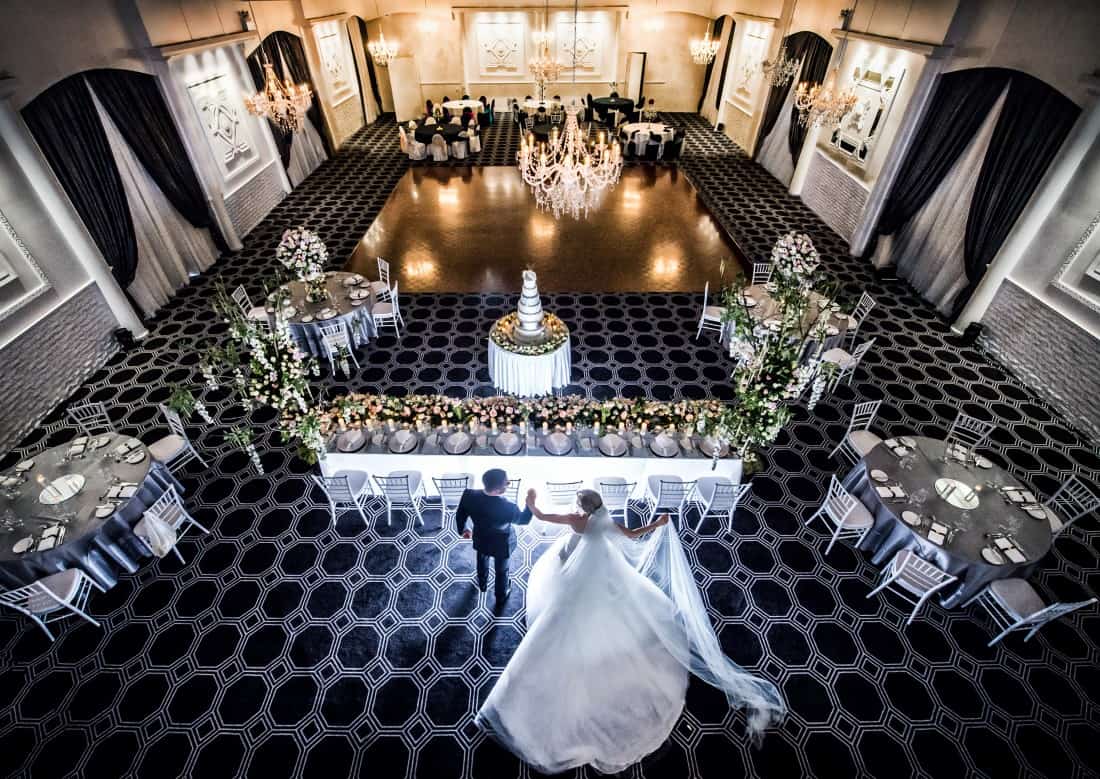Planning a wedding can feel overwhelming, but with proper organisation, clear priorities, and the right mindset, it can be a joyful experience. This guide is designed to simplify the process into manageable steps, helping you reduce stress and stay focused on what matters most: celebrating your love.
Summary
Planning a wedding can be overwhelming, but staying organised and focusing on the essentials can make it stress-free. Start by setting a realistic budget, then create a clear timeline for tasks like booking the venue, sending invitations, and finalising vendors. Delegate tasks to trusted friends or hire a wedding planner for support. Keep your guest list small and choose a venue that suits your budget and style. Prioritise self-care, simplify traditions and focus on the love you’re celebrating. Remember, the key is to enjoy the process and not stress over perfection.
Steps In Planning A Stress-Free Wedding
1. Set A Realistic Budget
Creating a budget is the foundation of any wedding plan, and starting here is essential to avoid financial stress later on.
- Determine your total budget: Sit down with your partner and discuss how much you can spend on the wedding. If family members contribute, talk openly about how much they can provide. Consider all potential sources of funds, including savings, monthly income, and contributions from both families.
- Break down the budget: Divide the total amount into key categories, such as the venue, catering, attire, photography, entertainment, and décor. Allocate about 5-10% of your budget for unexpected expenses.
- Track your spending: Use a spreadsheet or wedding budgeting app to monitor your expenses. Stay close to your spending to avoid going over budget.
- Tip: Set up a separate savings account specifically for wedding-related expenses. This will help keep your regular finances separate and make it easier to track spending.
2. Build A Wedding Timeline
A solid timeline will help you stay organised and ensure everything gets done on time. The earlier you start planning, the smoother the process will be.
- 12-18 months before the wedding:
- Choose your wedding date.
- Book your venue and secure any key vendors, such as the photographer, caterer, and officiant. Popular venues and vendors can book out over a year in advance, so it’s crucial to lock them in early.
- Begin dress shopping if you’re planning on wearing a custom or designer gown, as these often require several months of lead time.
- 6-9 months before the wedding:
- Send out invitations or save the dates.
- Finalise your guest list and arrange travel accommodations for out-of-town guests.
- Start planning your honeymoon and make necessary bookings.
- Confirm details with your vendors, such as menu selections with the caterer.
- 3-6 months before the wedding:
- Have dress fittings and schedule trials for hair and makeup.
- Confirm all bookings and contracts with vendors.
- Finalise your décor and seating arrangements.
- One month before the wedding:
- Apply for your marriage licence.
- Create a final seating plan and communicate it with your caterer and venue.
- Finalise speeches and vows if you’re writing your own.
On the wedding day, make sure someone else (a wedding coordinator, trusted friend, or family member) is handling logistics so you can relax and enjoy your day without worrying about last-minute details.
3. Delegate Tasks
No matter how organised you are, planning a wedding involves many moving parts, and it’s impossible to do everything yourself. Delegating tasks is essential to staying sane and stress-free.
- Assign specific responsibilities: Whether coordinating with vendors, managing RSVPs, or organising the décor, give trusted family members or friends specific tasks. For example, one person could liaise with the florist while another handles transportation logistics for the bridal party.
- Hire a wedding planner: Consider hiring a professional wedding planner if your budget allows. They are experts in managing vendors, coordinating the schedule, and ensuring everything runs smoothly on the wedding day. A planner can help you stick to your budget by recommending cost-effective vendors and solutions.
- Tip: Even if you don’t hire a full-time planner, consider hiring a day-of coordinator to handle all the logistics on the big day. This allows you to relax and focus on enjoying the moment.
4. Simplify Your Guest List
Finalising the guest list can be one of the most stressful parts of wedding planning. A smaller guest list often means less stress, lower costs, and a more intimate celebration.
- Start with close family and friends: Focus on inviting the most important people to you and your partner. Resist the pressure to invite distant relatives or acquaintances you haven’t seen in years.
- Be mindful of your budget and venue capacity: Make sure your guest list fits within your budget and the capacity of your venue. Cutting the guest list can significantly reduce expenses on catering, venue size, and other areas.
- Consider a destination wedding: If you’re worried about offending people by limiting your guest list, a destination wedding can naturally reduce the number of attendees without causing hard feelings. Many people cannot attend due to travel constraints, but those who make it will likely be your closest friends and family.
5. Choose The Right Venue
The venue is one of the most important elements of your wedding, as it sets the tone for the entire day.
- Consider your guest count: Ensure the venue comfortably accommodates your guest list before booking. An overcrowded venue will make the event chaotic, while an oversized venue may feel empty.
- Factor in location and logistics: Choose a convenient venue for you and your guests. If you’re planning a destination wedding or a venue far from where most guests live, ensure adequate travel and accommodation options.
- Read the contract carefully: Venue contracts can be complex, so ensure you understand all the details, including cancellation policies, overtime fees, and what’s included in the rental fee. Ask about extra costs like insurance, staffing, or security.
- Tip: If your venue offers all-inclusive packages, such as catering and décor, this can simplify planning and reduce costs.
6. Take Time For Yourself
Taking regular breaks for self-care is essential amidst all the planning. Wedding planning can be stressful, and it’s easy to feel overwhelmed if you don’t make time to relax.
- Schedule self-care activities: Whether it’s a trip to the spa, a yoga class, or a quiet night at home, set aside time for activities that help you recharge.
- Stick to a healthy routine: Eat regular meals, stay hydrated, and get plenty of sleep. It’s easy to let self-care slip during stressful times, but maintaining a healthy routine will help you manage stress better and keep your energy levels up.
- Don’t hesitate to ask for help: If you’re feeling overwhelmed, reach out to your partner, family, or friends. They’ll be more than happy to support you through the planning process.
7. Incorporate Meaningful Traditions But Be Flexible
Weddings are filled with traditions, but you can follow some of them. Focus on the most meaningful traditions for you and your partner, and feel free to skip the rest.
- Select meaningful traditions: Choose elements that reflect your values and story as a couple, whether a special family ritual or a cultural tradition. These can add a deeper sense of meaning to your ceremony and celebration.
- Let go of unnecessary customs: If a tradition doesn’t resonate with you, skip it. For example, you can forego the garter toss, bouquet toss, or cake cutting if they don’t feel like your style.
8. Focus On What Matters Most
Your wedding is about celebrating the love between you and your partner. Don’t get too caught up in creating a “perfect” event.
- Keep perspective: Remember, your guests are there to celebrate your love and commitment, not to judge every detail of your wedding. If something goes wrong on the day, anyone will unlikely notice, so don’t stress over small issues.
- Enjoy the process: Wedding planning should be fun! Enjoy the excitement of planning this special day and cherish the moments leading up to your wedding.
- Prioritise your relationship: Spend quality time with your partner throughout the planning process. The wedding is one day, but your marriage is a lifelong journey.
Conclusion
By breaking down wedding planning into manageable steps, delegating tasks, and staying focused on what matters, you can enjoy a stress-free journey to your big day. Stick to your budget, prioritise your well-being, and keep the focus on celebrating your love—because that’s what matters.
FAQs About Wedding Planning
What Is the Most Stressful Part of Wedding Planning?
Finalizing a guest list may be the most stressful part of wedding planning. You, your fiancé, and both sets of parents often have opinions about who should (and shouldn’t!) be invited on the big day. Cutting a guest can feel painful, but it’s unrealistic to think that your budget and venue can accommodate everyone.
What Are Red Flags To Not Get Married?
Here are a few communication-related red flags to look out for from your partner: Shuts down when having tough, emotional conversations. Runs away from, minimizes, or completely ignores conflict.
Should You Get Hair Or Makeup Done First?
And the answer is-whichever you prefer! Yup, there is no one-size-fits-all answer to the hair or makeup first debate. It all comes down to personal preference, the occasion, and a few other factors that play into which order may be a better option.
What Is Considered A Small Wedding?
Small wedding: Less than 50 guests. “That number can fit comfortably in a backyard with 6 or so tables,” she says. Tiny wedding: 15 people or less. (You might also see “minimony” or “micro wedding” used to describe a wedding of this size.)
What Is A Minimalist Wedding?
Minimalist weddings aim to clear even the visual clutter-so stick with solid colors or soft, muted motifs. They also tend to favor neutral and natural color palettes like black, navy, cream, white, or taupe-but don’t be afraid to add a strategic pop of color to bring everything to life.



